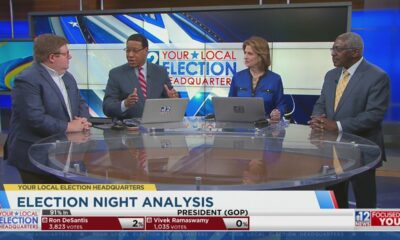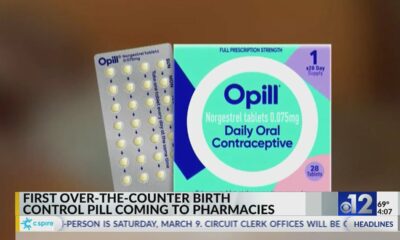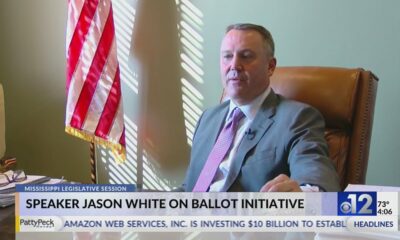Mississippi News
Mississippi abortion law: Reddit AMA recap
Reddit AMA recap: What's next for Mississippi after Roe?
On Friday, July 22, community health reporter Isabelle Taft answered questions on Reddit about the future of abortion, reproductive rights and health care in Mississippi after SCOTUS overturned Roe v. Wade and Mississippi's trigger law was put into effect.
Click to jump to a specific question:
What other medical procedures will be impacted by the change, and how will they be affected?
What will happen in the case of ectopic pregnancy where the mother will die without an abortion?
Who determines if an abortion would save the life of the mother?
Can a pro-life activist sue a doctor or hospital for performing a life-saving abortion if they feel the mother wasn't in mortal danger? And how would this threat affect the quality of healthcare across the state?
The broader uncertainty over how new abortion laws will actually be enforced
Do you expect the Mississippi Legislature to continue to restrict abortions in Mississippi (as in removing the exception for rape or life of the mother)?
Do you think there is any risk of people getting arrested for using drugs off-label for abortion?
Do you foresee more Mississippi women [choosing sterilization] instead of building families going forward?
Q: What other medical procedures will be impacted by the change (examples being miscarriages or IVF), and how will they be affected?
A: It's not completely clear.
Right now, IVF is going on as usual in Mississippi, but I spoke with a doctor earlier this month who is concerned about the future. Defining fertilization as the beginning of life, which the personhood amendment the state voted down in 2011 would have done, would create big legal challenges for IVF, which often involves the creation of excess embryos. But Sen. Joey Fillingane, one of the main architects of anti-abortion laws in the state and the author of the abortion trigger ban, told me that enshrining legal protections for IVF and surrogacy is one of his priorities in this area for the next legislative session.
Nationally there's also been a lot of reporting about people being denied miscarriage management drugs mifepristone and misoprostol by pharmacists because these are also used in medication abortions. I've spoken with pharmacists and doctors about this in Mississippi, and anecdotally no one reported a patient being denied a prescription after Dobbs. (Also important to note that we're not aware of anyone who was prescribing abortion pills in Mississippi before Dobbs besides the Pink House, where more than half of all abortions were medication abortions.)
And a natural miscarriage is not distinguishable from a miscarriage induced by abortion pills. So one possibility is that people who are miscarrying will be more reluctant to go to the hospital if they have complications, because they could be concerned about intrusive questioning and even law enforcement involvement. (I think people's experiences with this are going to vary drastically based on where they live, the hospital they go to, even who happens to be on shift at a given time.)
Q: What will happen in the case of ectopic pregnancy where the mother will die without an abortion? Asking for both the letter of the law and what you believe will actually happen in practice.
A: In cases like an ectopic pregnancy where it is very clear that the mother could die without an abortion and there is no chance of a live birth, the law clearly allows Mississippi doctors to do what they have done before the ruling in Dobbs: Terminate the pregnancy. I spoke with a doctor in the Delta this week who did exactly that, without any additional calls to attorneys or hospital administrators.
In practice, pregnancy can involve situations that are dangerous or potentially dangerous for the pregnant person but not as clear-cut as an ectopic pregnancy. Those are the situations that doctors I've spoken with are more concerned and confused about. Some pre-existing conditions like pulmonary hypertension make pregnancy itself very risky, but the threat to the person's life isn't imminent. Before Dobbs, physicians could have a conversation with their patient about the best course of action and the pregnancy could be terminated in Mississippi. Now, those conversations and choices come with the possibility of up to a decade in prison of a doctor winds up being criminally investigated.
Here's a story from this week that goes into what doctors are thinking about this issue.
Q: Who determines if an abortion would save the life of the mother? Is it the state or would a doctor be able to determine that?
A: The state's trigger law isn't crystal clear on the point of who makes the decision that a person's life is at risk, and how they're supposed to make that decision. This is what it says: “No abortion shall be performed or induced in the State of Mississippi, except in the case where necessary for the preservation of the mother's life or where the pregnancy was caused by rape.”
In practice, that determination is going to fall to doctors around the state, likely in some cases in consultation with hospital attorneys and ethics boards. In some cases, like ectopic pregnancies, the legal standard will be pretty clearly met. In others, it won't be, and doctors may choose not to perform an abortion where previously they would had a conversation with the patient about what to do.
Unlike Mississippi's ban, Louisiana law includes an exception for “medically futile” pregnancies, but the law also says the state health department is supposed to issue a list of what qualifies as “medically futile,” and it hasn't done so yet. But that exception should give doctors there more discretion than in Mississippi, where terminating a nonviable pregnancy is legal only if not doing so threatens the pregnant person's life.
Q: Can a pro-life activist sue a doctor or hospital for performing a life-saving abortion if they feel the mother wasn't in mortal danger? And how would this threat affect the quality of healthcare across the state?
A: To your question about the possibility of lawsuits, I think it's too early to say for sure what will happen in Mississippi because all of this is so new. Some OB/GYNs we've talked to expressed concern and confusion over the possibility of being sued by someone who believes an abortion wasn't necessary to save the life of the mother. They don't appear to be getting guidance on this from any agency or their employers.
Q: Can police legally force a pregnancy test on a woman they suspect is traveling to have an abortion? Can they detain that woman until she gives birth or dies?
Can state law enforcement legally use data from mobile devices to extrapolate if a woman might be seeking an abortion, then target that woman for investigation? Would a compiled list of these women be used legally as a function of abortion law enforcement?
A: I'm going to group your questions about police forcing pregnancy tests and using mobile data because they're related to the broader uncertainty over how these laws will actually be enforced.
Mississippi law doesn't have any provision saying a person may not travel out of state to seek an abortion, and the trigger ban specifies that police can't prosecute a woman for her own abortion. So it would not be legal to detain someone on the suspicion that they were going to travel out of state for an abortion.
I think it's pretty unlikely that law enforcement would use mobile data proactively to try to surveil for a potential abortion attempt in this way, especially because the trigger law says you can't prosecute a woman for her own abortion. I do think that when police get a report of a possible illegal abortion (say if a woman comes to a local hospital with complications), we're likely to see search warrants for mobile data as part of their investigation. This notably happened in the Latice Fisher case in Starkville a few years ago. She said she gave birth to a stillborn baby, and police found that she had searched for abortion pills and used that as part of the murder case against her, even though there was no evidence she had actually taken them. Charges were dropped after local and national advocates raised questions about the dubious test that had been used to claim her baby was born alive. Here's a Washington Post story about the case and its national implications post-Roe.
Q: Hello Isabelle, do you expect the Mississippi Legislature to continue to restrict abortions in Mississippi (as in removing the exception for rape or life of the mother)? Additionally, has [Philip] Gunn clarified his thoughts on IVF and its continued legal status considering his belief that life begins at conception?
A: I don't want to make any overconfident predictions but I do expect there will be discussion of further abortion restrictions next session. I think there is going to be appetite for strengthening laws against abortion pills, though I'm not sure what that will look like in practice because the state can't police people's mail and the pills are easy enough to order online from places where they are legal. That issue is clearly front of mind for anti-abortion folks in Mississippi, especially after billboards advertising abortion pills went up around Jackson. This is from an email that Pro-Life Mississippi sent out yesterday:
“Billboards are becoming the new battleground against the abortion industry. New billboards promoting abortion pills have appeared in Richland and Jackson… The Mississippi Attorney General's Office is working on a coordinated response to these types of deceptive advertisements that could result in harming women with dangerous medication.”
(Note that medication abortion has been in wide use around the world for decades with a very low rate of complications, including when used at home without formal medical supervision.)
I don't know if there will be a push to remove the exceptions but I haven't heard anything to that effect. It's worth noting that doctors told us that they don't expect anyone in Mississippi will be willing to perform abortions in cases of rape, given the legal risks, so that exception may effectively already be moot.
To my knowledge, Gunn hasn't clarified his stance on IVF. I would be surprised if there is any effort to do anything that would affect IVF: Sen. Fillingane, who authored the abortion ban, actually wants to pass legislation to make clear that IVF and surrogacy are protected in Mississippi. (He fathered twin sons via surrogacy last year so this issue is close to him.) And I think it's important to note that people who use IVF are generally people with means and access to channels of political influence. I don't see commitment to the idea of life beginning at fertilization leading lawmakers to pursue laws that would constrain IVF.
Q: Do you think there is any risk of people getting arrested for using drugs off-label for abortion? What precautions can they take? What are good resources for them?
Also, is it a legitimate worry that MS residents may not be able to travel out of state to get an abortion?
A: To your first set of questions, I don't want to make too many predictions because I think it's still unclear how law enforcement will seek to carry out these new laws. With 82 different counties, I think we're going to see a lot of variability in how police and DAs operate and how aggressive they are in investigating and punishing abortions. The trigger ban says a person can't be prosecuted for their own abortion. In pre-Roe Mississippi, women were not often prosecuted for their abortions but were frequently pressured to testify against doctors and others who had been involved in the abortion. The use of abortion pills is going to be really tough for state authorities to regulate because it's so easy to obtain them from overseas providers like Aid Access– who would Mississippi authorities prosecute?
This story looks at abortions and prosecutions in MS before Roe:
And this one discusses access to abortion pills and why the state will struggle to control it:
I don't know what we might see in the next legislative session. I do know the pro-life lawmakers I have spoken with have said they're not interested in trying to restrict Mississippians' travel out of state, and Justice Brett Kavanaugh – who joined the majority to overturn Roe – wrote that he would find such a law unconstitutional. But it's definitely true that many Mississippians won't be able to travel to obtain an abortion for logistical reasons. Advocates expect the closest clinic will ultimately be in Carbondale, Illinois, a six to seven-hour drive from Jackson. (Currently, clinics in Louisiana and Florida are providing abortions.)
Q: Concerning reproductive health: do you think the state government will now create/enact legislation to make it harder for people to obtain birth control (specifically Plan B or any other estrogen-type pill form of birth control obtained via prescription)?
A: From what I have heard from lawmakers and anti-abortion advocates, there are not plans to do this or push for it.
Q: As a woman who was considering children and is now leaning towards sterilization due to the unacceptable risk involved in Mississippi, do you foresee more Mississippi women making that choice instead of building families going forward? We already have a brain drain problem, so do you think we'll see even more of us younger folks moving to states with safer healthcare access?
All I have are anecdotal experiences on this, but a lot of my female friends have been pursuing sterilization and long-term contraceptive methods much more actively since the ruling–one has already scheduled a hysterectomy out of state by a doctor willing to perform it (notoriously hard to get when you're a young woman with no children).
So along those lines, do you think we will be seeing bans on women's contraceptives? I doubt we'll see bans on condoms, but plan B and birth control pills could end up on the chopping block given how uneducated people tend to be on how those actually work.
A: One OB/GYN we spoke with mentioned she's experienced an uptick in requests for tubal ligations since the Dobbs ruling. She also has concerns about the fate of certain emergency contraception, including IUDs, and it's only reasonable to think other Mississippians might share that concern. Gov. Tate Reeves and other state leaders have said publicly they will not be targeting contraception, but have not specified what they do and do not consider contraception – despite our repeated questioning.
I also spoke recently with Terri Herring, the head of Choose Life Mississippi and a powerful anti-abortion advocate in the state. She said she doesn't plan to advocate for restrictions on any pregnancy prevention measures, and she includes IUDs in there.
Q: I've seen that Google can help police track internet searches for abortions and how to get one. What safety factors do Mississippians need to consider when trying to figure out how to access abortion?
A: I haven't done any reporting on this topic so I'll refer you to this general guide from the Electronic Frontier Foundation, a nonprofit that defends civil liberties on the internet.
Q: Is Mississippi one of the states that are not allowing women with certain diagnoses, for example, rheumatoid arthritis to be able to obtain prescriptions such as methotrexate for their health? (I've read Methotrexate and a few other prescriptions have been denied in some states since the overturn because the medication can potentially be used for abortion.)
A: I have not talked to a lot of pharmacists, but the handful I've spoken to have said they haven't heard of this happening in our state. I haven't heard from any doctors about patients being denied their prescriptions either. If anyone has direct experience with this please send me an email (itaft@mississippitoday.org)!
Q: Also if you do cross state lines for abortion care what will happen if you come back into the state?
A: This is a great question. Abortion complications are rare so for most people, nothing will happen.
If you do have a complication and go to a hospital to get treatment, the hospital is legally required to report the complication to the Health Department. (We recently obtained the annual reports on these complications for 2015-2020, and most years 0 complications were reported. In two years, there were four complications each, all non-fatal.) The complication reporting form doesn't ask for the patient's name, SSN, DOB or anything like that, but it does ask for details like age, race, marital status and previous pregnancy outcomes.
After the ruling in Dobbs, Ochsner, which operates some hospitals in South Mississippi, reminded staff that they are required to report abortion complications to the health department.
I don't know what kinds of decisions hospitals and medical staff will make as to when/whether to involve the police in a situation like that.
Biloxi police told Gautama Mehta of the Sun Herald that if they get a report of a possibly illegal abortion, which is a felony, their understanding is that they are required to investigate it.
The next Reddit AMA:

This article first appeared on Mississippi Today and is republished here under a Creative Commons license.
Mississippi News
Willis Miller found guilty of crashing into ATV, killing child
SUMMARY: In Oktibbeha County, Mississippi, a jury found Willis Miller guilty of crashing into an ATV and killing a child while under the influence. The incident occurred in April 2022, resulting in the death of a child named Gabby Frazier. Miller was convicted of aggravated DUI and aggravated assault. The jury took about 30 minutes to reach a verdict. Miller is scheduled to be sentenced on April 18. This tragic event highlights the consequences of driving under the influence and the importance of responsible behavior on the road.
The post Willis Miller found guilty of crashing into ATV, killing child appeared first on www.wcbi.com
Mississippi News
Mississippi lawmakers hear from felony suffrage advocates
SUMMARY: Mississippi lawmakers held a hearing on felony suffrage, with a House bill that would have restored voting rights to non-violent felons dying in the Senate. The bill would have granted suffrage five years after conviction or release. Kenneth Almons, a former felon, shared his story of disenfranchisement and advocated for voting rights. This was the first bill in over a decade to address voting rights for felons. Almons expressed frustration at being unable to vote despite serving his time and paying taxes. Faith leaders in Mississippi are advocating for Medicaid expansion as well.
The post Mississippi lawmakers hear from felony suffrage advocates appeared first on www.wjtv.com
Mississippi News
Couple, dog escape from boat fire on the Reservoir
SUMMARY: A couple and their dog escaped from a boat fire at the Barnett Reservoir with help from nearby fishermen. The fire was reported around 1:15 p.m., and Reservoir Fire Chief Josh Swales stated that the fuel on board was the main source of the fire. The Mississippi Department of Environmental Quality was called to handle the fuel that leaked into the water. Firefighters used 7,000 gallons of water and foam to extinguish the fire, which took about two hours. No injuries were reported in the incident.
The post Couple, dog escape from boat fire on the Reservoir appeared first on www.wjtv.com
-
Mississippi News3 days ago
Mississippi will soon be bombarded with cicadas
-
SuperTalk FM2 days ago
4 tornadoes touched down in Mississippi during latest round of severe storms
-
SuperTalk FM7 days ago
Ex-cop arrested in connection to killing at Jackson apartment complex
-
SuperTalk FM3 days ago
2 Jones County correctional officers arrested in smuggling bust
-
Mississippi News5 days ago
Columbus schools may see needed upgrades with bond issue
-
Local News3 days ago
Almost 3,500 Mississippi Veterans have enrolled in VA health care in past 365 days, 28% increase over last year
-
SuperTalk FM10 hours ago
Chance of parole denied for man who killed 3 Choctaw Indian tribal members
-
SuperTalk FM6 days ago
Explosion at elementary school in Mississippi Delta hospitalizes two employees















































